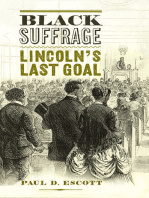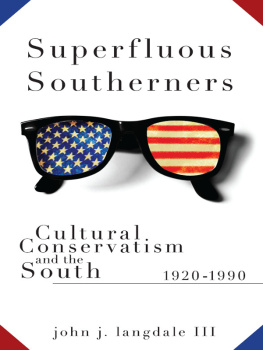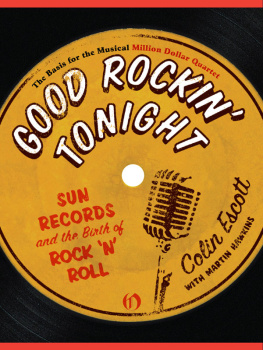1991 The University of North Carolina Press All rights reserved
The paper in this book meets the guidelines for permanence and
durability of the Committee on Production Guidelines for Book
Longevity of the Council on Library Resources.
Manufactured in the United States of America
95 94 5 4 3 2
Library of Congress Cataloging-in-Publication Data
The South for new southerners / edited by Paul D. Escott and David R. Goldfield.
p. cm.
Includes bibliographical references and index.
ISBN 0-8078-1932-8 (cloth : alk. paper).
ISBN 0-8078-4293-1 (pbk.: alk. paper)
1. Southern StatesCivilization. I. Escott, Paul D., 1947
II. Goldfield, David R., 1944
F 209. S 7 1991
975dc20 90-50015
CIP
Illustrations on pages 13, 16, 96, 133, and 141
by Doug Marlette.
Used by permission.
THIS BOOK WAS DIGITALLY MANUFACTURED.
Preface: Getting to Know the South
PAUL D. ESCOTT
The South is one of Americas special regionsspecial in its history, its character, its ways of life, and the good life it has to offer. Newcomers may feel puzzled or perplexed by the differences they encounter, but that is not unusual. A little frustration or even anger are normal reactions for many newcomers to the South.
Whether you are newly arrived or a longtime resident, this book will help you understand the South. With understanding, we hope, will come greater appreciation for the rare and valuable qualities that are part of Southern life. Among the authors of this book are non-Southerners whose roots lie in the Midwest, the Far West, the Northeast, and even in Brooklyn. They shared others initial impressions, but all adjusted happily to the South. They all began to consider themselves Southerners and found living in the South to be both satisfying and fascinating.
First impressions, however, are sometimes disconcerting. Differences of attitude or oudook appear in conversation, as Southerners make comments or ask questions that non-Southerners do not expect. Though trivial in themselves, such small matters point toward larger differences. They produce confusion and leave non-Southerners feeling like outsiders. Some new arrivals even conclude that the South is like a foreign country.
For example, when they meet strangers, Southerners often show little interest in their occupations. Instead of asking, What do you do? they ask, Where are you from? Southerners ask about your religion. Although such questions would be considered impolite in some parts of the United States, Southerners will ask, What church have you joined? or invite you to visit their congregations. Another striking difference in religious practices is the custom of ending public prayer, even in large Southern cities, with the words, In Jesus name we pray. Amen. (This may happen even when Jewish people are present on the platform.)
Southerners are very polite and personable in shops and stores. Non-Southern customers who are used to rude treatment from sales clerks notice a wonderful change in the South. In stores Southerners are adept at an aw shucks kind of hospitality and can talk at great length about almost nothing. (Some seem reluctant to get down to business and would rather talk about the weather.)
After living in the South for several months, however, non-Southerners may begin to notice a formidable reserve. You cant really get to know them, say some newcomers. They dont let you into their circle. The non-Southerners who make these comments feel unwelcome and wonder if they are viewed as modern-day carpetbaggers.
The influence of history is tangible in the South. Some white Southerners still feel strongly about the Civil War, an event that many non-Southerners know only through books. Few Southerners ever were confused about which side won and which side lost, or where this bloodiest of Americas many wars was fought. Their stance may seem excessively proud or defiant to new residents.
Southerners can be strangely defensive in other ways. They bitterly resent criticism of their communities, even if they do need more restaurants or better facilities. Non-Southerners who are openly critical are sometimes made to feel unwelcome in the normally hospitable South.
What do these differences mean? What do incidents like these reveal about the South? In the chapters that follow, the authors will attempt to explain the distinctive features of the South. They will do so with information and analysis, but also through personal experience and anecdotes that express the special qualities of life in the South.
Chapters 1, 2, and 3 focus on the connection between the Souths special character, its history, and certain social and racial patterns that have made the Southern experience different. They treat, in order, the regions history, its sociology, and race. Chapters 4 through 7 look more closely at particular aspects of the South: the character of and attitudes toward its urban places; the nature of sex roles in the home and workplace; the changing political system; and economic development.
The authors hope that these essays will lead readers to make their own discoveries about the South, to understand it better, and to contribute more fully to its unique society. They are grateful to the many non-Southerners who helped them, as residents and professional students of the South, to learn more about this important and interesting region.
This book grew out of a series of public programs sponsored by the North Carolina Humanities Council and the South Carolina Humanities Council. We gratefully acknowledge their support and the assistance of their able staffs, particularly Brent Glass and Leland Cox. Additional financial support came from Ciba-Geigy and The Jones Group. The International Studies Program at the University of North Carolina at Charlotte provided invaluable assistance in planning and making local arrangements. We wish to thank its director, Harold Josephson, and staff members Levela Rickard, Judy Case, and Marian Beane, who were very helpful and always pleasant.
The South for New Southerners
Chapter One: The Special Place of History
PAUL D. ESCOTT
Southern people are much like people everywhere, but their region and its history also set them apart. The South has had a history and experience different from the rest of America, and therefore the regional culture that has evolved there is different, too.
Everyone knows about the Souths warm climate, the institution of slavery, the Confederacy, and perhaps the historic importance of cotton and agriculture in the region. Other features that have affected Southern life include the persistently rural character of settlement patterns and of society in general. It has also proved significant that the great waves of immigration in the nineteenth and early twentieth centuries bypassed the South.
Many of the individual elements that make the South distinctive are not unique there. (Small towns and rural farming communities share common features throughout America.) The South is also varied; it is not everywhere the same. But a particular combination of experiences and characteristics has made the South different from all other American regions. If you keep the special features of its history in mind, you will be able to understand the region better.







